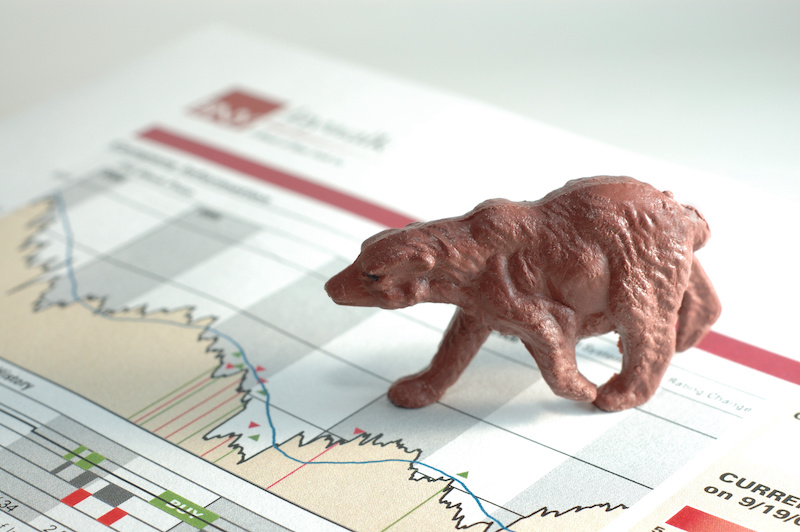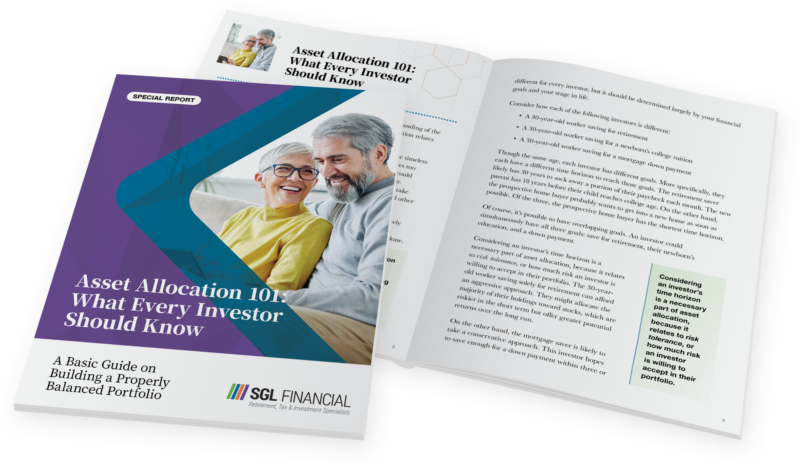Where To Invest In A Bear Market
by Gabriel Lewit

Do the impacts of a bear market on your investments have you puzzled about when and where to shuffle some of your assets? As a financial advisor in Buffalo Grove, IL, we are here to assist you with strategic asset allocation that accounts for current and future economic conditions.
If you’re considering investing in anything right now, especially if it’s an investment vehicle like stocks, it’s in your best interest to take a look at all risk factors before jumping in.
You can strike the right balance with strategic asset allocation as guided by our team of fee-only fiduciary financial advisors at SGL.
Use this article to help you decide:
- Where to invest in a bear market
- How your risk tolerance relates to the impacts of a bear market
- How to diversify your portfolio
Where to invest in a bear market

You deserve to feel confident in your investment portfolio at all times. If you do not, it may be time to get a second opinion or revisit the risk within your portfolio. Here are some quick tips to help you start thinking about where to invest in a bear market:
- Invest in what you know.
- Invest in what you like.
- Invest in what you can afford.
- Invest in something you understand and can control, or at least have a degree of influence.
- If it’s possible to lose money investing, don’t invest more than the amount that would be manageable to lose without sacrificing your quality of life.
Keep in mind that this is all relative. A one-on-one conversation with a financial advisor will be your most effective starting point.
What is a bear market?
When you think of a bear market, you probably envision a large grizzly bear, as portrayed in the financial world. Well, the term “bear market” comes from the idea that when prices fall sharply and stay low for an extended time, it’s like being mauled by a bear.
The term has been around since at least 1848 but didn’t become popular until after World War II as stock markets recovered from their wartime losses and then declined again in 1952-1953 (the so-called “Nifty 50” crash). Today’s definition is that a bear market:
- Is a period during which stock prices fall 20% or more
- Can happen over many months or even years (it all depends on how long the decline lasts)
- Is a period characterized by investor pessimism
- Is the result of any number of triggers (such as war), not just one single factor
While there’s no guarantee when the market will recover, it’s possible that you can enjoy some opportunities if you buy very carefully. Receiving financial advisory services from a professional has nothing to do with trying to time the market and everything to do with long-term comprehensive financial planning.
Read: How To Invest In A Volatile Market With The Help Of A Financial Advisor In Buffalo Grove, IL
Impacts of a bear market and your investment portfolio
There’s no such thing as a perfect time to invest, but there are certainly some better times than others. So how can you invest in a bear market?
When the market is trending down, and prices are dropping, it’s time to think about your portfolio and what investments will be best for you at this point.
- You can consider reevaluating your current portfolio and how it relates to your overall risk tolerance. If you find, perhaps, that you are taking more risk than you are comfortable with you might want to look at safer investment options that are available to you.
- You should also remain focused on your long-term investment goals. What was the original goal for that money you’ve invested, when do you need that money, how long do you have to recover any potential losses? These are all options that should be considered before you make any rushed decisions about selling your positions or moving to cash.
Key Takeaway: If you are tempted to sell, remember your time horizon for retirement

The temptation to sell can feel strong during a bear market, but remember your time horizon for retirement. If you’re investing for retirement and have time on your side, it’s okay to be invested in individual stocks and wait out the bear market. Bear markets do not last forever—and when they end, they can provide opportunities for investment growth.
Some investments do well in higher times of inflation
There are several investments that can do well in a bear market and the inflation that follows. Here are some of the most popular options, but remember, being diversified among various asset classes and investment types is always your best hedge against market downturns and inflation:
- Real estate investing: Many people think real estate is only for wealthy investors, but you don’t have to be rich to get started. By taking advantage of government incentives such as tax breaks, you can invest in rental properties on your own, even if you’re working with little more than your savings account.
- Consumer staples: These stocks will generally do well when prices rise because they provide products that customers need no matter what happens to their income level or how much they spend on food overall (which is usually one thing people cut back on during hard times).
- Energy sector companies such as oil producers might be one of the investment options that make most sense for you.
- Index funds are an option if you want to take a more passive approach to your investments.
- Exchange-traded funds (ETFs) are an option for some investors who want to diversify their portfolios and invest during economic uncertainty.
- Utilities have been known to do well during economic downturns because they provide essential services that people need regardless of their financial situation.
 Once the economy has entered a bear market, investing can be challenging and risky. As wealth management investment advisors in Chicago, we are here to assess your overall risk and time horizon. If you are living on a fixed income, this is especially vital. Even if you don’t have ample funds to invest right now, you can still prepare for retirement by saving mindfully.
Once the economy has entered a bear market, investing can be challenging and risky. As wealth management investment advisors in Chicago, we are here to assess your overall risk and time horizon. If you are living on a fixed income, this is especially vital. Even if you don’t have ample funds to invest right now, you can still prepare for retirement by saving mindfully.
This way, when prices drop and investments become more affordable again, and they will, you won’t miss out on getting started with your next big goal because it wasn’t possible at the time. Schedule a meeting with a financial advisor in Buffalo Grove, IL, to evaluate your next move.
